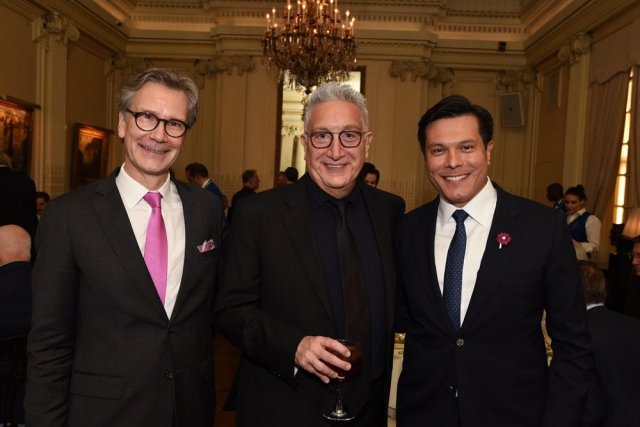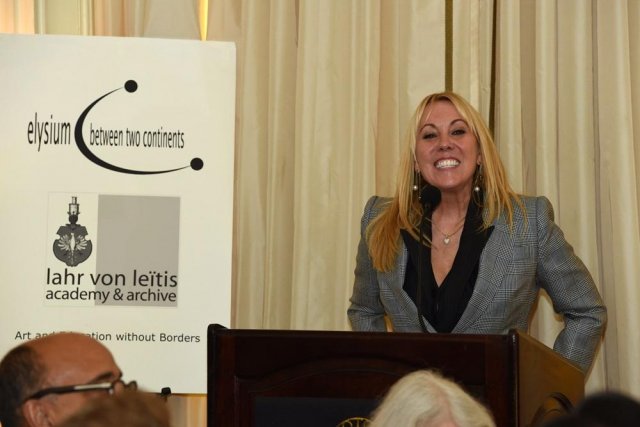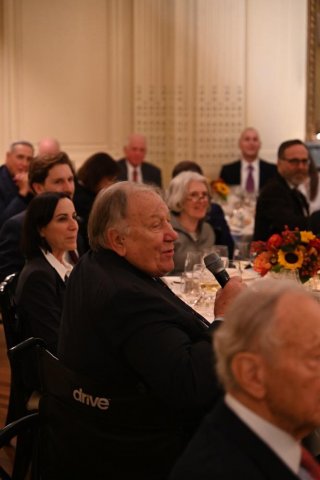Honoring Political Theater
Elysium- between two continents’ Erwin Piscator Awards
By: Jessica Robinson - Nov 12, 2024
On October 29, 2024, New York’s historic Lotos Club came alive as Elysium- between two continents hosted its 37th Annual Erwin Piscator Awards benefit dinner.
This year’s ceremony began with opening remarks by Heather Randall, widow of actor Tony Randall. Her introduction to the evening underscored the importance of Elysium’s mission and set the tone for a night that celebrated both art and activism.
But wait a minute. Just what is Elysium, and who is this Erwin Piscator?
Founded in 1983 by Gregorij von Leitis, Elysium—between two continents is an organization dedicated to combating hate, racism, and anti-Semitism through the transformative power of art.
Just two years after its founding, von Leitis launched the Erwin Piscator Awards as a tribute to a man whose groundbreaking theatrical vision and enduring humanitarian impact resonates on both sides of the Atlantic.
“Throughout his life,” von Leitis reflects, “Piscator used theater as a weapon against the destructive forces of fascism.” Today, Elysium carries that torch forward, reviving the works of artists exiled and persecuted by mid-20th century fascist regimes. Through theater, opera, concerts, lectures, and exhibitions, the organization keeps their voices alive and their legacies thriving.
One notable example is Elysium’s revival of Viktor Ullmann’s opera The Emperor of Atlantis. Written in the Terezín concentration camp, the opera imagines a world where Death refuses to do its job, granting humanity immortality. Performed under the shadow of Nazi oppression, Ullmann’s haunting allegory showcases art’s enduring ability to confront tyranny and provoke thought.
Who Was Erwin Piscator and why does his legacy loom so large?
Born in Germany in 1893, Piscator began his theater career in 1913 as an apprentice at the Hoftheater in Munich. He rose to prominence as a leading director during the Weimar Republic and, alongside Bertolt Brecht, co-created the epic theater movement. This innovative approach to theater was inherently political, aiming to provoke activism and critical thinking. Unlike traditional theater, which sought to immerse audiences in fictional worlds, epic theater intentionally broke the "fourth wall," urging audiences to confront issues like class struggle, war, and social injustice. The aim was not escapism but empowerment through reflection. In short, this German theater director and producer revolutionized storytelling by making it unapologetically political.
Yet Piscator wasn’t only about bold ideas. He was a technical trailblazer, pioneering the use of multimedia projections, mechanized sets, and documentary-style storytelling. As Brecht famously said of him: “Piscator is the greatest theater man of all time. He will leave a legacy which we should use.”
With the rise of Nazism, Piscator fled to New York where, in 1938, he founded the Dramatic Workshop at the New School for Social Research. There, he trained a generation of actors, playwrights, and directors, including Judith Malina, Marlon Brando, Harry Belafonte, Elaine Stritch, Tony Curtis Tennessee Williams and many others.
Piscator’s philosophy that art could spark change lives on through Elysium’s annual awards ceremony
Back to the 37th Erwin Piscator Awards Event
Since 1986, the Erwin Piscator Awards have celebrated those who use art to shake up the status quo. Past recipients include luminaries such as Robert Wilson, Ellen Burstyn, and Ben Gazzara.
Honoring Moisés Kaufman
The first honoree of the night was Moisés Kaufman, the bold playwright, director, and founder of the Tectonic Theater Project. Known for works like The Laramie Project and Here There Are Blueberries, Kaufman’s fearless storytelling reflects Piscator’s belief that art can be a megaphone for change.
The Laramie Project in particular stands out as a groundbreaker. In telling the story of the 1998 murder of gay University of Wyoming student Matthew Shepard, Kaufman used hundreds of verbatim interviews by town members. The Laramie Project is often used in schools to teach about prejudice, making it a powerful voice in raising awareness about hate crime and LGBTQ rights.
Recognizing Michael Hormel
The second honoree, philanthropist Michael Hormel, was celebrated for his unwavering support of the arts, animal welfare, and social justice. Hormel’s award recognized his lifelong commitment to using his resources for the greater good, embodying the altruistic values that Elysium champions.
Mark Your Calendar: Healing a Fractured World
On December 10, 2024, Elysium will present Healing a Fractured World, a musical-literary tribute to Egon Lustgarten, an Austrian-Jewish composer whose life and work embody resilience and creativity in the face of unimaginable adversity.
Born in Vienna in 1904, Lustgarten was a promising composer and conductor whose career was disrupted by the rise of Nazism. Forced to flee Austria after the Anschluss in 1938, he sought refuge in the Unite States, eventually settling in Tenafly, New Jersey. Despite the hardships of exile and financial instability, Lustgarten remained dedicated to his craft, composing prolifically throughout his life. Even though he staged a semi-professional production of his opera Helga Hal in 1945, his work was largely overlooked during his lifetime.
Lustgarten passed away in1961, leaving behind a rich archive of musical scores, diaries, and correspondence. Thanks to his daughter’s generosity, his entire estate was gifted to Elysium, who have made it their mission to revive his legacy.
Lustgarten’s Healing a Fractured World will debut at Vienna’s Kleine Ehrbar Saal. Intertwining his music with his writings, the evening will present an intimate portrait of an artist who found resilience and meaning in creativity despite immense hardship.
If you happen to be in Vienna on December 10th, this is an event you won’t want to miss.
Upholding a Legacy of Hope and Activism
From the annual Piscator awards to upcoming projects like Healing a Fractured World--Elysium continues to prove that art can challenge, heal, and transform. By spotlighting suppressed artists, reviving forgotten works, and nurturing future trailblazers, Elysium keeps Piscator’s legacy alive, ensuring that art remains a guiding light in a fractured world.



